OFWs: PH heroes even in time of COVID pandemic
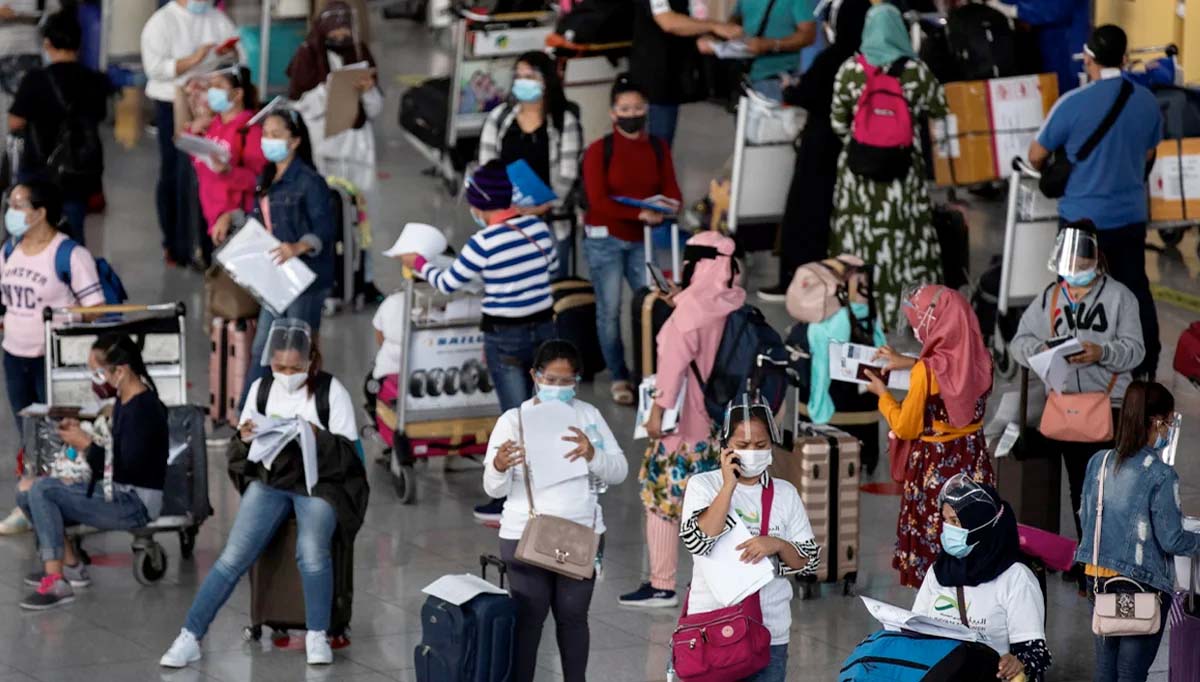
OFWs wait at the airport. INQUIRER FILE PHOTO
MANILA, Philippines—Every December in the Philippines, people do not only celebrate the holiday season, but they also observe The Month of Overseas Filipinos—honoring the country’s modern-day heroes.
Proclamation No. 276, signed by the late President Corazon C. Aquino in 1987, declares December as The Month of Overseas Filipinos to recognize and honor Overseas Filipinos (OFs)—who are spread across the globe as immigrants, workers, students and professionals.
The proclamation also acknowledged the contribution of OFs who “struggle against the prior regime and fought for the restoration of Philippine democracy.”
As the proclamation stated, OFs has since then contributed to the Philippine economy through their taxes and remittances.
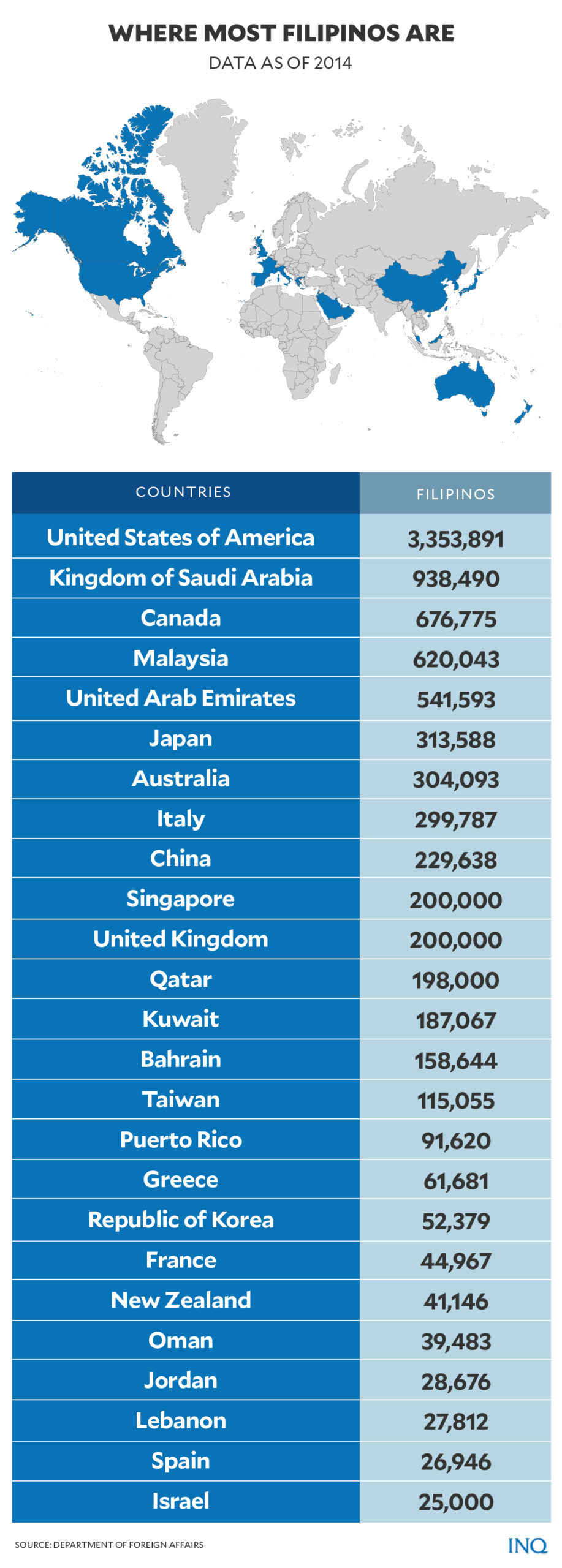
Graphic by Ed Lustan
Even with the ongoing global health pandemic due to SARS-CoV-2, the virus that causes COVID-19, OFs continue to play a huge part in helping the country’s economy recover after over a year of stringent lockdowns—which pushed the economy to its lowest point since World War II.
In observance of The Month of Overseas Filipinos, here are some of the facts about OFs and their situation amid the COVID-19 pandemic.
Massive repatriations
In July, Foreign Affairs Secretary Teodoro Locsin Jr. described the repatriation of Filipinos from various countries, due to COVID-19, as the biggest in Philippine history.
“It’s the biggest repatriation ever in our history, possibly the biggest repatriation anywhere of any country in the world,” Locsin said.
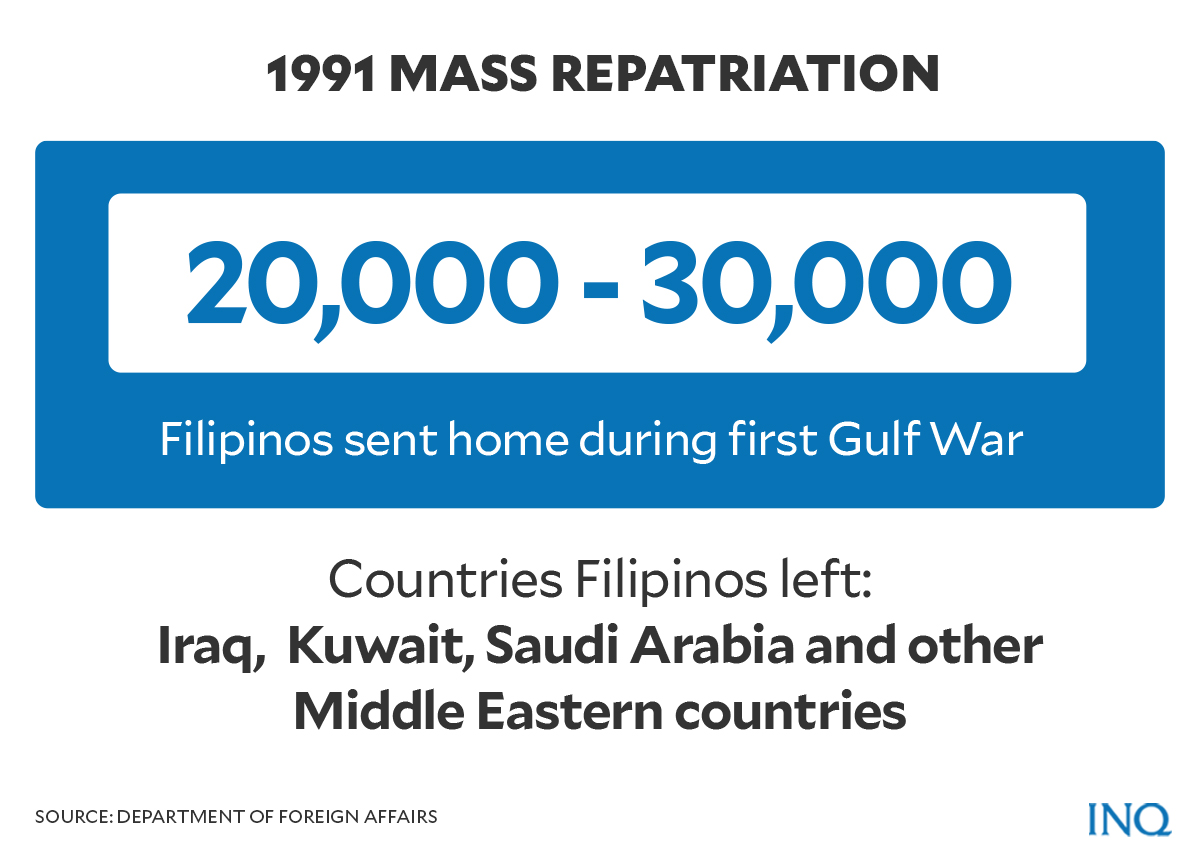
Graphic by Ed Lustan
“The rest of the world is astonished at the scale and success of our repatriation, it’s never been done,” he added.
READ: ‘Biggest ever repatriation in PH history’ is ongoing
For context, the last mass repatriation of the magnitude described by Locsin took place in 1991 when 20,000 to 30,000 Filipinos were brought home from Iraq, Kuwait, Saudi Arabia, and other Middle Eastern countries during the first Gulf War.
The latest data showed that Locsin was in fact not exaggerating as the current repatriation numbers were more than 10 times higher as the government continues to aid stranded OFs and Overseas Filipino Workers (OFWs) abroad amid the risks of the COVID-19 pandemic.
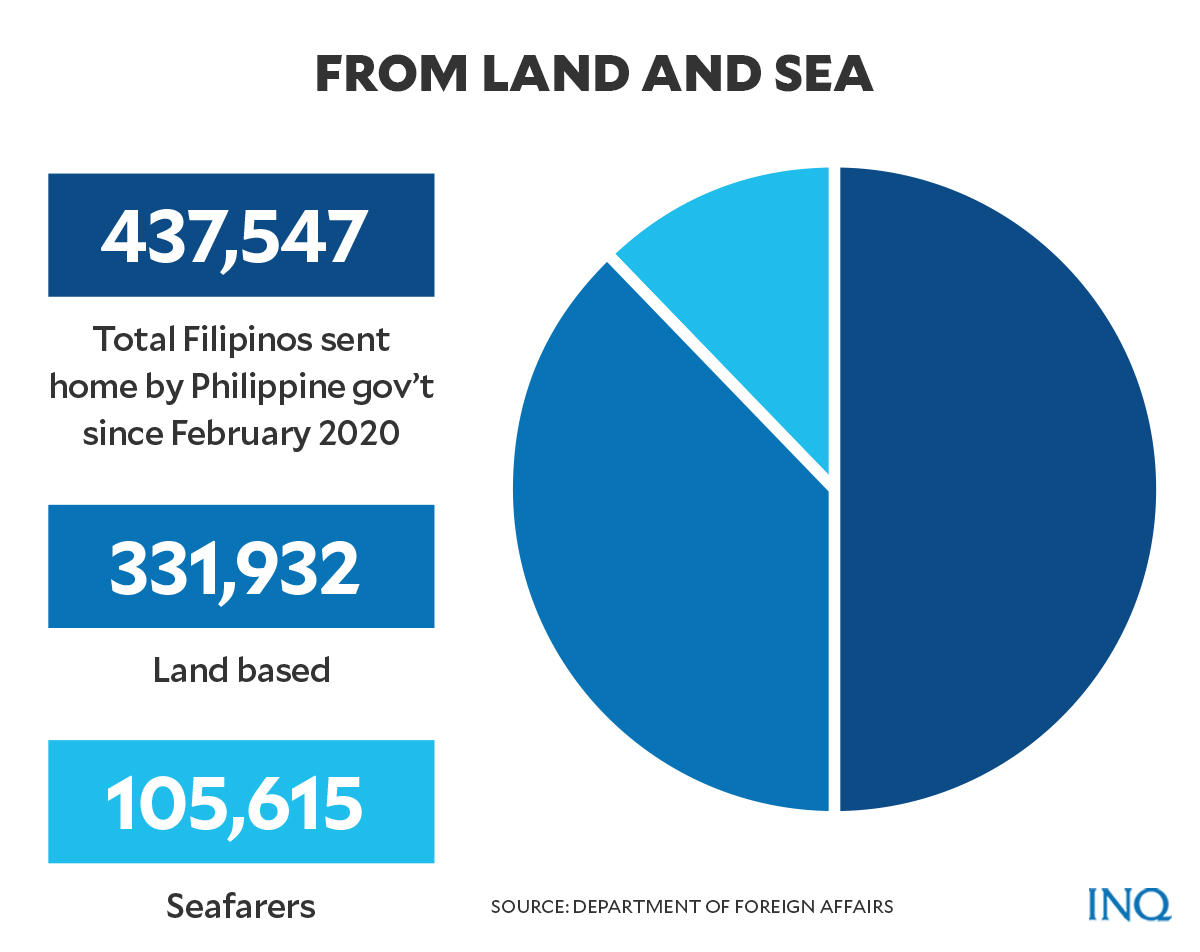
Graphic by Ed Lustan
Since 2020, as COVID-19 swept through the world, over 1 million Filipinos had already been sent home for various reasons, but mainly because of the pandemic.
The Philippine government believes more displaced and stranded Filipinos abroad are still awaiting repatriation flights.
By the end of 2020, the Philippines saw an unprecedented number of repatriated Filipinos—791,623, according to a study of the International Organization for Migration (IOM) United Nations Migration released last May.
READ: OFW departures pick up, shows need for jobs defies COVID
The latest data from the Department of Foreign Affairs (DFA) showed that as of Nov. 26, the government has facilitated the repatriation of 437,547 OFs since February 2020.
Of these, 105,615 were seafarers, while 331, 932 were land-based OFs.
On Dec. 13, the DFA welcomed the arrival of an additional 150 stranded OFs from Europe.
“The arrival of this flight is a first step in bringing home our stranded kababayan in Europe,” said Foreign Affairs Undersecretary Sarah Lou Arriola, of the DFA’s Office of Undersecretary for Migrant Workers’ Affairs, in a statement.
The Overseas Workers Welfare Administration (OWWA) estimated in November that the government has assisted a total of 803,521 repatriated OFWs since the beginning of the COVID-19 pandemic.
“We have hit the 800K mark in terms of OFWs given food, quarantined, and transported to their home regions since May 2020,” OWWA chief Hans Leo Cacdac said in a tweet on Nov. 25.
These OFWs, Cacdac said, were given assistance, tested and given transport by the Department of Labor and Employment’s Overseas Workers Welfare Administration, the DFA, Department of Transportation and other government agencies.
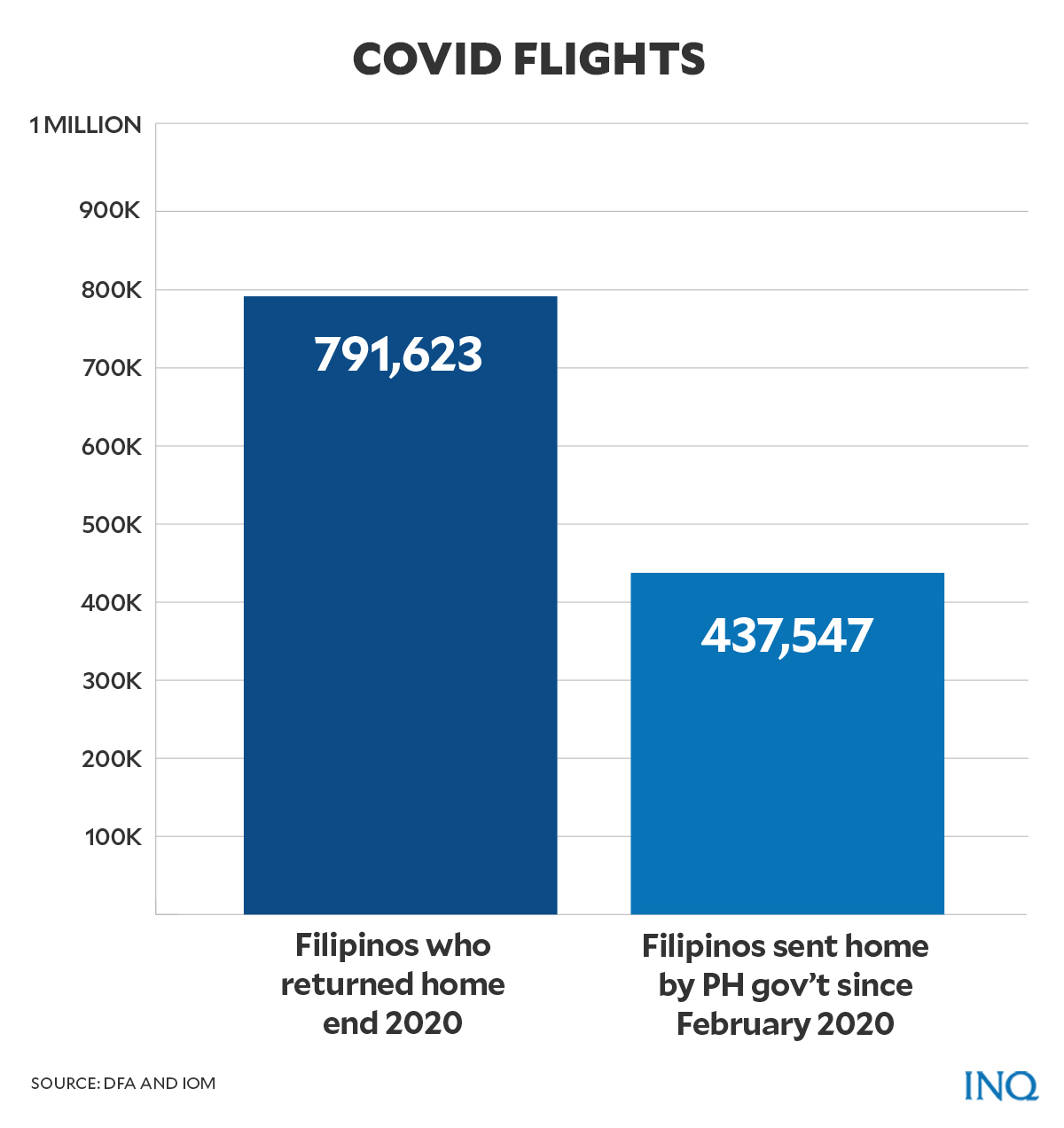
Graphic by Ed Lustan
Labor Secretary Silvestre Bello III reported on Nov. 28 that based on OWWA’s records, a total of 809,374 OFWs had been transported back to their homes.
However, to address the influx of repatriated Filipinos this December, OWWA has appealed to the government for an increase in its allocation for assistance funds.
Last September, the agency has already requested an additional P4.2 billion funds for the repatriation of OFWs until Dec. 31 this year.
“We are expecting a deluge of OFWs on Christmas time especially those who were not able to come home last year. These OFWs will try to go home this Christmas,” Cacdac said.
COVID-stricken OFs
Aside from monitoring and helping OFs and OFWs amid the pandemic, the DFA also publishes a bulletin of Filipinos who contracted COVID-19 overseas.
According to the agency’s data as of Dec. 7, there were a total of 24,222 total confirmed COVID-19 cases among OFs and OFWs across 103 countries and territories.
Of those recorded confirmed infections, 8,423 were undergoing treatment, 14,356 recovered or were discharged from hospitals or medical facilities, and 1,443 died.
Higher remittances
During the pandemic, the Philippines has benefitted a lot from the OFs’ and OFWs’ remittances to their families back in their hometown—especially as the country’s economy took a heavy beating in the past two years.
Preliminary data from the Bangko Sentral ng Pilipinas (BSP) showed that OFs’ cash remittances from January to September this year have reached around P1.2 trillion. This was higher than the estimated P1.1 trillion remittances during the same period last year.
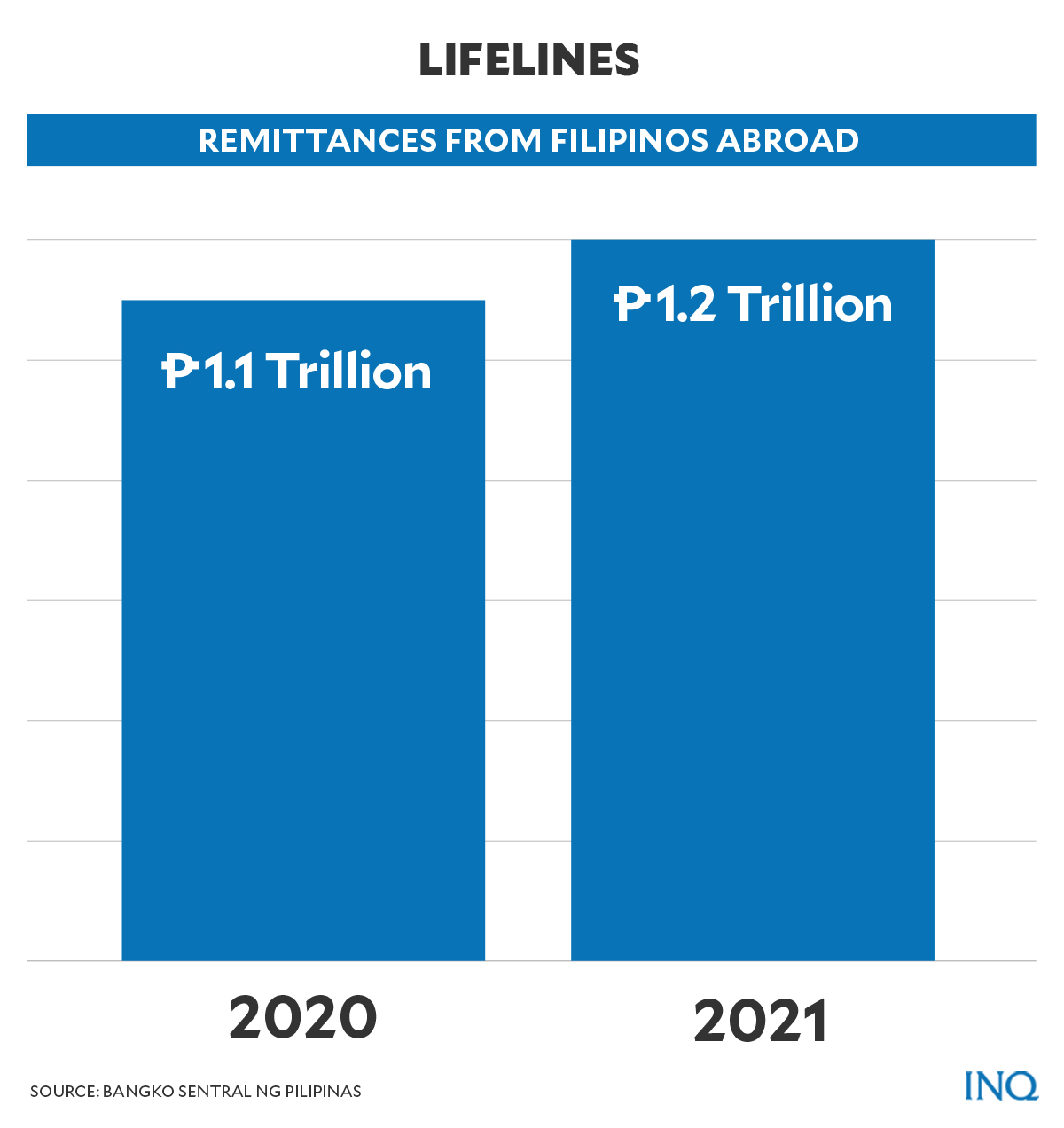
Graphic by Ed Lustan
According to the BSP, there was a 5.6 percent growth rate in remittances between the same period in 2020 and 2021.
In the first nine months of 2021, P921.3 billion of the total inflows came from land-based workers, while P241.6 billion were sent by sea-based OFs.
There was a 6.2 percent growth rate for land-based remittances and a 3.5 percent increase for sea-based remittances compared to the first nine months of 2020.
Remittances from abroad are not only seen as a lifeline for many Filipino families, especially during the pandemic.
The Small Business Corporation (SBCorp), the financing arm of the Department of Trade and Industry (DTI), had said in a statement that the OFWs “have been an economic lifeline of the Philippines, with their remittances contributing nine percent of the country’s Gross Domestic Product (GDP).”
“For decades they have supported millions of households and have powered the Philippine economy, until the pandemic struck,” it added.
Heightened risks, burden
Illegal recruitment, which has been one of the monsters preying on OFWs ever since, continues to thrive in the Philippines amid the ongoing COVID-19 pandemic and travel restrictions.
Figures from the Philippine Overseas Employment Administration (POEA) showed that cases of illegal, unethical, and unfair recruitment practices began rising again this year.
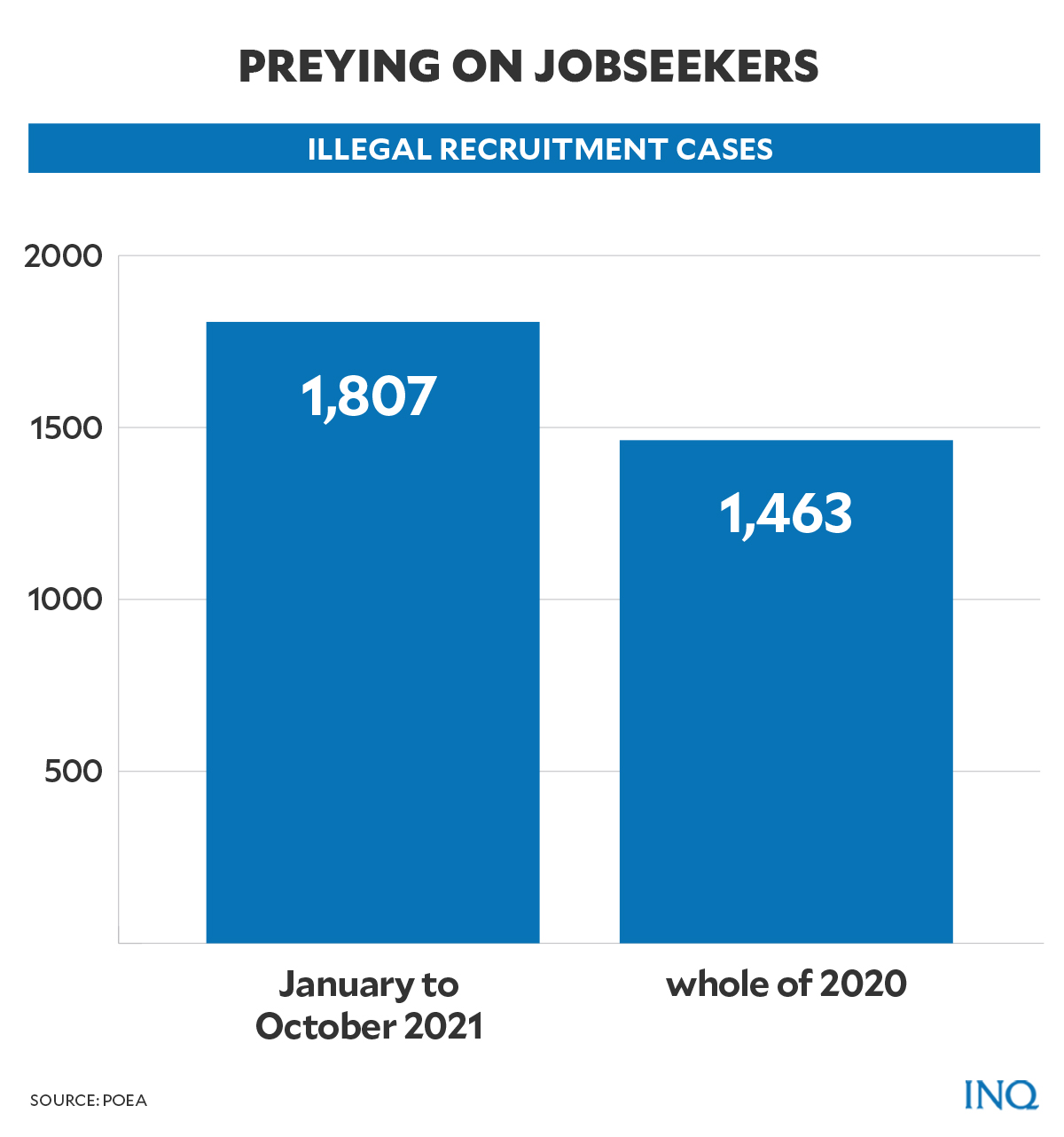
Graphic by Ed Lustan
Easing travel restrictions in the Philippines and other countries coincided with the increasing number of docketed cases of illegal, unethical, and unfair recruitment cases this year.
From January to October, the agency has monitored a total of 1,807 cases—which was higher than the total 1,463 cases recorded for the whole year of 2020.
“There [was] a steady indication that even during the time of COVID-19, illegal, unethical, and unfair ways of recruitment have continued,” said POEA director Levinson Alcantara.
READ: Illegal recruiters know no pandemic, continue to prey on OFWs
A study by Alcestis “Thetis” Abrera Mangahas, former deputy regional director of the International Labor Organization (ILO) for Asia Pacific launched last July, presented the worrisome conditions of many OFWs.
The study “Seeking Justice: Developing Improved OFW Feedback and Complaints Mechanisms” painted a bigger picture of the risks faced by many OFWs and the struggle to attain relief or justice because of widening gaps in the processing and handling of their cases by competent authorities.
Among the pre-employment or pre-deployment struggles that OFWs go through, according to a survey conducted as part of the study, are:
- High costs of recruitment.
- Illegal recruitment, which can be caused by unlicensed agencies or prohibited practices by licensed agencies.
- Contract and visa deception, which is often linked with lack of information on contract terms and conditions and misuse of visa provisions.
Mangahas also detailed in her study the eight types of challenges that add to the struggles of OFWs:
- Contract violation
- Maltreatment or mistreatment
- Immigration and document-related problems
- Contract substitution
- Health or medical problems
- Personal issues
- Sexual abuse that included harassment and rape
“OFWs often find it untenable to seek justice under the destination country’s hardly understood institutions and fragmented laws and policies, especially when confronted with unfriendly immigration and work permit processes,” explained Mangahas at an online press conference.
READ: OFW burden grows heavier as relief, justice fall through system gaps
The study likewise discussed the discernible discrepancy in cases and risks between male and female OFWs.
READ: Women bear brunt of heightened risks for OFWs
These issues, including the uncertainty of having a job after returning to the Philippines due to massive repatriations amid the ongoing pandemic, were just some of the long list of OFW woes that were reported in the past few months by organizations such as the Blas F. Ople Policy Center, the IOM Philippines, and the Global Fund to End Modern Slavery (GFEMS).
TSB
READ: National action plan emerging vs illegal recruitment
READ: Gov’t told: Protect OFWs, new department against corruption
For more news about the novel coronavirus click here.
What you need to know about Coronavirus.
For more information on COVID-19, call the DOH Hotline: (02) 86517800 local 1149/1150.
The Inquirer Foundation supports our healthcare frontliners and is still accepting cash donations to be deposited at Banco de Oro (BDO) current account #007960018860 or donate through PayMaya using this link.